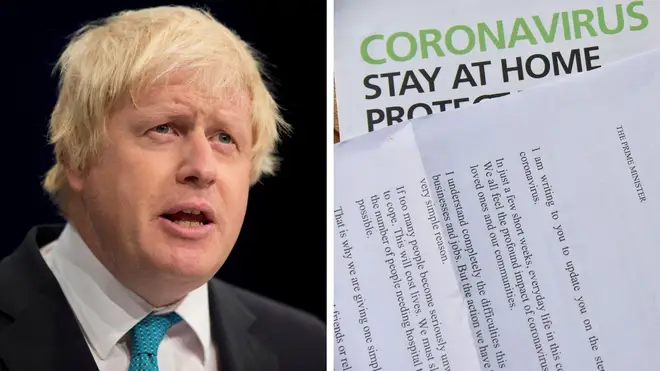
Iain Dale 7pm - 10pm
11 September 2021, 22:31 | Updated: 12 September 2021, 22:49

Boris Johnson is set to outline plans to repeal some powers currently held by the Government, such as the power to close schools and limit social gatherings, in a move away from locking down the country.
Mr Johnson said the measures under the Coronavirus Act were "necessary but intrusive", and he was "determined" not to maintain powers that were no longer needed.
"Thanks to the efforts of the public, the NHS and our phenomenal vaccination programme, we reached Step 4 in our road map and life has returned to a sense of normality," said the Prime Minister.
"These extraordinary times required necessary but intrusive measures.
Read more: Health Secretary announces £10k fines for 'cowboy' travel test providers
Read more: Coastguard pulls man's body from English Channel
"But I'm determined to get rid of any powers we no longer need because of our vaccine defences.
"I will set out the next phase in our Covid response shortly."
The powers expected to be repealed include those allowing the closure of the economy, the imposing of restrictions on events and gatherings, the power to temporarily close or restrict access to schools, and powers to detain infectious people.
A number of other powers under the Act will be retained, such as giving statutory sick pay to those isolating from day one, and the power to direct schools to reopen if they close against Government advice.
It will also still be a legal requirement to isolate if you test positive for coronavirus.

James O'Brien on the 'sugar rush' of reopening schools
The Coronavirus Act is the Act of Parliament that gives the Government the power to do things like close down the economy and shut schools in response to Covid-19.
The Act has been criticised by many anti-lockdown MPs, with MP David Davis saying it "contains some of the most draconian powers ever introduced in the UK".
Read more: 'Armoured jet skis to be used by Border Force' to spin back migrant boats
Read more: Arson at Manchester mosque investigated as hate crime
The Prime Minister will announce the change at a press conference next week, where he will set out the Government's plans to tackle Covid-19 over the coming months.
There will be a focus on vaccination at the press conference, with a reluctance to impose further lockdowns.
Mr Johnson will say that vaccines will continue to be the first line of defence over the autumn and winter, a high-risk time for coronavirus as other respiratory illnesses circulate.

Vaccine passports will result in indirect discrimination against groups, academic tells LBC
The Government also expects the independent Joint Committee on Vaccination and Immunisation (JCVI) to recommend details of a jab booster programme next week.
There are plans in place to begin giving booster jabs to the most vulnerable as early as this month.
However, Professor Sir Andrew Pollard, whose team developed the Oxford/AstraZeneca vaccine, said on Friday that he believes the priority should be to donate vaccines to countries where people are still awaiting a first dose.
His views have been echoed by his Oxford colleague Professor Dame Sarah Gilbert, who helped design the vaccine, and who said booster jabs may not be needed by everyone.
Read more: Minister refuses to apologise for swearing at 'Stop Brexit Man'
Read more: Police seize £160m of cocaine in luxury yacht raid as six arrested
The Medicines and Healthcare products Regulatory Agency (MHRA) said on Thursday that the Pfizer and AstraZeneca jabs are safe to use as boosters, but the JCVI has yet to give its advice to ministers.
The JCVI has already said a third dose should be offered to people with severely weakened immune systems.
Several other countries, including the US, Israel, Hungary, Germany and France, have announced or have started third dose programmes for at least some of their citizens.

Will there be new rules on masks or a new lockdown?
The UK's chief medical officers are also drawing up advice to Government on whether children aged 12 to 15 should be vaccinated after the JCVI said the margin of benefit from vaccinating healthy children was too small to say they should receive a jab.
The plan to focus on vaccination comes after reports that ministers were considering a so-called firebreak lockdown in October.
The i newspaper reported an unnamed member of the Scientific Advisory Group for Emergencies (Sage) saying a "precautionary break" could be part of "contingency plans".
But Health Secretary Sajid Javid said: "I don't think that's something we need to consider."
Read more: 'The terrorists failed': Boris Johnson reflects on 20 years from 9/11
Read more: Manchester's top cop pledges 'we'll take your cars, cash and homes'
He said no decisions are "risk-free" but insisted the "best defence" against another wave of the virus is the vaccine programme.
A No 10 spokesman previously said it is not true that the Government is planning a lockdown or firebreak around the October half-term, but added that they have "retained contingency plans as part of responsible planning for a range of scenarios".
They said: "These kind of measures would only be reintroduced as a last resort to prevent unsustainable pressure on our NHS."